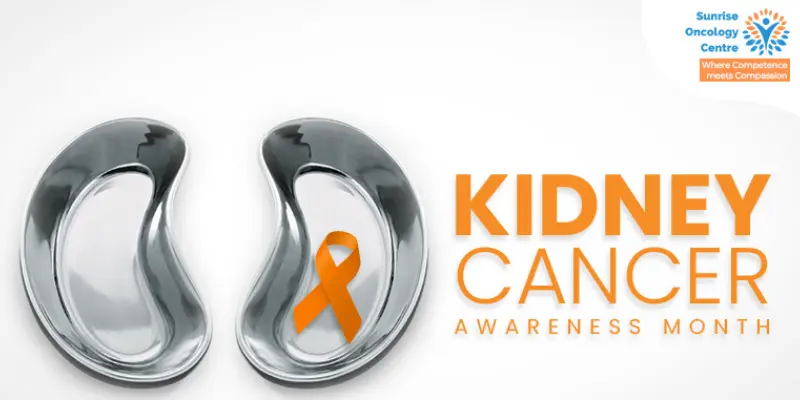March is Kidney Cancer Awareness Month – Kidney cancer is among the third most common type of genitourinary cancer in adults. It occurs mostly in men compared to women and every year more than 79,000 people are affected due to kidney cancer.
It is also known as the ‘Silent Killer’ as there are no noticeable symptoms at the early stages of cancer.
On this day, let’s spread awareness and educate people on the risk factors, symptoms, and causes of kidney cancer to avoid the fatal ailments of this life-threatening disease.
What is a Kidney Cancer?
Kidney Cancer occurs when there is an abnormal growth of cells in the kidney. It begins when the cells grow, divides, and multiply out of control. It forms masses of cells resulting in tumor formation.
Types of Kidney Cancer
There are several types of kidney cancer including –
- Renal Cell Carcinoma (RCC) – It is the most common type of kidney cancer and accounts for 80- 85% of all kidney cancer cases. It starts developing in one single kidney and starts spreading to both kidneys.
- Transitional Cell Cancer (TCC) – Transitional cell cancer is a type of cancer that affects the cell lining of the urinary tract. It happens in 6-7% of kidney cancer cases and can also affect other parts of the urinary tract, including the renal pelvis, ureters, and urethra.
- Renal Sarcoma – Renal sarcoma is a rare type of cancer that accounts for 1% of kidney cancer cases. It is caused by the abnormal growth of cells in the kidney around the connective tissues which leads to tumors and other complications.
- Wilms Tumor – It occurs mostly in children. It accounts for 5% of kidney cancer cases.
Signs of Kidney Cancer
Kidney Cancer does not show any noticeable signs in its early stages. It starts showing visible signs only after cancer starts spreading. The most prominent signs of symptoms witnessed among patients are –
- Blood in the urine
- Lower back or side pain
- Weight Loss
- Fatigue
- Fever
- Nausea
- Vomiting
- Swelling in the legs and feet
- Bone Pain
- High Blood Pressure
- Anemia
- High Calcium
Risk Factors of Kidney Cancer
The primary cause of kidney cancer is yet unknown. However, there are some factors that may increase the chances of getting kidney cancer such as –
- Age – The risk of kidney cancer increases with age.
- Gender – Men are twice as likely prone compared to women.
- Obesity – Being obese or overweight increases your risk of kidney cancer.
- High blood pressure – It has been linked to hypertension which can cause an increased risk of kidney cancer.
- Smoking – People who smoke regularly are two to three times more likely to develop kidney cancer than those who do not smoke.
- Family history: If you have a family member with kidney cancer, you may be at increased risk for the disease.
- Genetic Changes – Changes in genes can increase the risk of developing cancer.
- Radiation Therapy – Women who have received past treatments related to reproductive organs have an increased risk of developing kidney cancers.
- Exposure to certain chemicals: People who are exposed to certain chemicals, such as cadmium and asbestos, may have an increased risk of getting kidney cancer.
Treatments for Kidney Cancer
There are a number of different ways to treat kidney cancer. The treatment for kidney cancer typically involves surgery to remove the affected kidney parts. In some cases, radiation therapy or chemotherapy may also be used. The type of treatment options used will depend on the stage of cancer and the overall health of the patient.
- Surgery – It is the popular treatment for kidney cancer. The surgical treatment depends on the severity of the tumors.
Partial Nephrectomy – It removes part of the kidney that is affected by a tumor.
Radial Nephrectomy – In this surgery, the entire affected kidney is removed along with the tissue around it. The surgeon may also remove some lymph nodes in the area.
- Radiation Therapy – It is the second most popular choice after surgery. It is usually recommended in patients with one kidney. It is also used to provide pain relief for patients with kidney cancer symptoms.
- Targeted drug therapy – It targets specific molecules of certain genes and proteins that help cancer cells to survive and grow. It is mostly done after surgery to reduce the risk of cancer coming back.
- Immunotherapy – The patient’s own immune system is boosted to kill or destroy cancer cells.
- Chemotherapy – It is a treatment given through the mouth or veins. It is a powerful drug to kill cancer cells that stop the growth of cancer cells in the body.
Prevention Strategies for Reducing the Risk of Developing Kidney Cancer
There are a number of prevention strategies that can be employed to reduce the risk of developing kidney cancer. Some of these strategies included are –
- Avoiding tobacco – Consumption of tobacco is one of the most significant risk factors for developing kidney cancer. Quitting smoking or avoiding tobacco can dramatically reduce the risk of developing kidney cancer.
- Maintaining a healthy weight – Being overweight or obese increases the risk of developing kidney cancer. Maintaining a healthy body weight through proper diet and exercise can help reduce this risk.
- Controlling High Blood Pressure – Lifestyle changes such as eating healthy food, weight loss, and a balanced diet can help to control your blood pressure.
- Eating a healthy diet – A diet rich in fruits, vegetables, and whole grains has been shown to reduce the risk of developing kidney cancer. Avoiding processed meats and excessive alcohol consumption can also help lower the risk.
- Getting regular exercise – Regular exercise has been proven to reduce the risk of developing kidney cancer. Getting at least 30 minutes of moderate exercise each day can help lower the risk.
Conclusion
Kidney cancer is a serious condition and can be potentially fatal if not detected early. Knowing the risk factors of kidney cancer can help you identify whether or not you may be at an increased risk for developing this illness. If you notice any of the above symptoms then consult your doctor about necessary screening options and lifestyle changes that may reduce your risk of developing this disease. Taking proactive steps toward prevention could save your life in the future.

